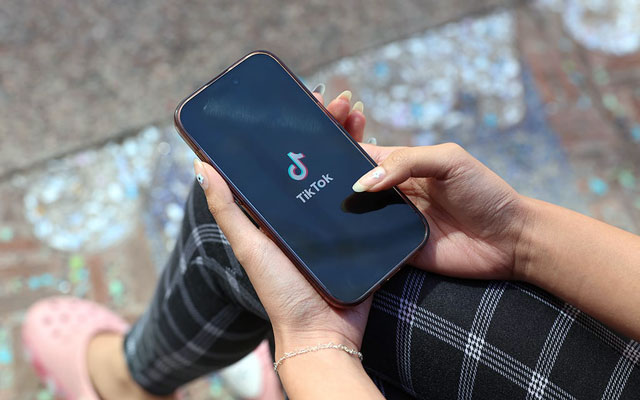Photo by Sam Ballesteros/Cronkite News: The House gave overwhelming approval Wednesday to a bill that would ban TikTok – which critics say can be used by the Chinese government to spy on Americans – if its owners don’t sell to another company first. Arizona lawmakers split on the vote.
Ian McKinney/Cronkite News
WASHINGTON – Arizona lawmakers split Wednesday as the House gave overwhelming, bipartisan approval to a bill that would ban the use of TikTok in the U.S. if the owners of the social media app don’t first sell it to another company.
Supporters say the measure is needed because TikTok, owned by China-based ByteDance, can be used by the Chinese government to spy on Americans. But fans defended the popular app and said the vote just proves that “the government is so completely out of touch with reality.”
“This is where our generation is at with media and with how we engage and how we connect,” said Lauren Valenzuela, a Tucson resident who uses TikTok to help advertise her business, Sigfus Designs. “And you (lawmakers) can just kind of write it off like this silly little thing, or you can engage with it and make it work.
“The thinking with all this stuff is just so dated, and we just need some new people in there,” she said.
But Rep. Greg Stanton, D-Phoenix, who voted for the bill, said that TikTok users will be able to continue using the app if the bill passes – it will just ensure that they “can continue TikTok safely and securely.”
“We cannot allow a foreign adversary to collect sensitive data on millions of Americans, or use this platform to spread misinformation to undermine our democracy,” Stanton said in a statement after the vote.
Stanton joined Republican Reps. Juan Ciscomani of Tucson, Eli Crane of Oro Valley, and Debbie Lesko of Peoria in support of the bill. Opponents from Arizona included GOP Reps. Andy Biggs of Gilbert, and David Schweikert of Fountain Hills, and Democrat Ruben Gallego of Phoenix.
Rep. Raúl Grijalva, D-Tucson, and Rep. Paul Gosar, R-Bullhead City, did not vote.
The Arizona delegation reflected the bipartisan vote by the full House, which passed the bill on a 352-65 vote. It now goes to the Senate where its chances are unsure after Sen. Rand Paul, R-Ky., vowed to block the measure, as he did the last time the issue came up in the Senate.
“The passage of the House TikTok ban is not just a misguided overreach; it’s a draconian measure that stifles free expression, tramples constitutional rights, and disrupts the economic pursuits of millions of Americans,” Paul said in a statement Wednesday.
This is not the first time TikTok has faced a ban. The company fought off similar threats in 2020 when then-President Donald Trump tried to ban it as a threat to national security. Since then, however, Trump has shifted his rhetoric on the app, saying getting rid of TikTok would merely benefit Facebook.
“I don’t want Facebook, who cheated in the last Election, doing better,” Trump said in a Truth Social post last week. “They are a true Enemy of the People!”
President Joe Biden has said he would sign the TikTok bill if Congress gets it to his desk.
Biggs said in a statement that the bill is “not a serious attempt to thwart China’s influence or data collection in the United States.”
“It’s time we get serious about restoring our independence from China and truly protecting Americans’ privacy from both foreign and domestic spying agencies,” his statement said.
Even though he did not vote Wednesday, Grijalva said he supports the bill because it will help protect Americans’ data and privacy.
“Americans should be able to access TikTok while ensuring the platform is not a tool for foreign government spying, intrusive personal data collection and manipulation,” he said in a prepared statement.
ByteDance said Wednesday that more than 170 million Americans are using TikTok, and it touted an Oxford Economics report that claimed small and midsized businesses generated more than $15 billion in revenue through the app in 2023.
Valenzuela said the app has “definitely been an asset” in helping her business grow, and while she “doesn’t have all her eggs in one basket,” a potential ban of TikTok could hurt her brand.
“It’s been great for bringing in, whether it’s a tattoo artist or a tattoo client for my husband, or for me letting people know about new things we’re doing,” Valenzuela said. “I also help put on different small-business markets here in town. We’ve even got one this weekend, so TikTok is great because it really will help push out events and things that are kind of happening at that moment.”









